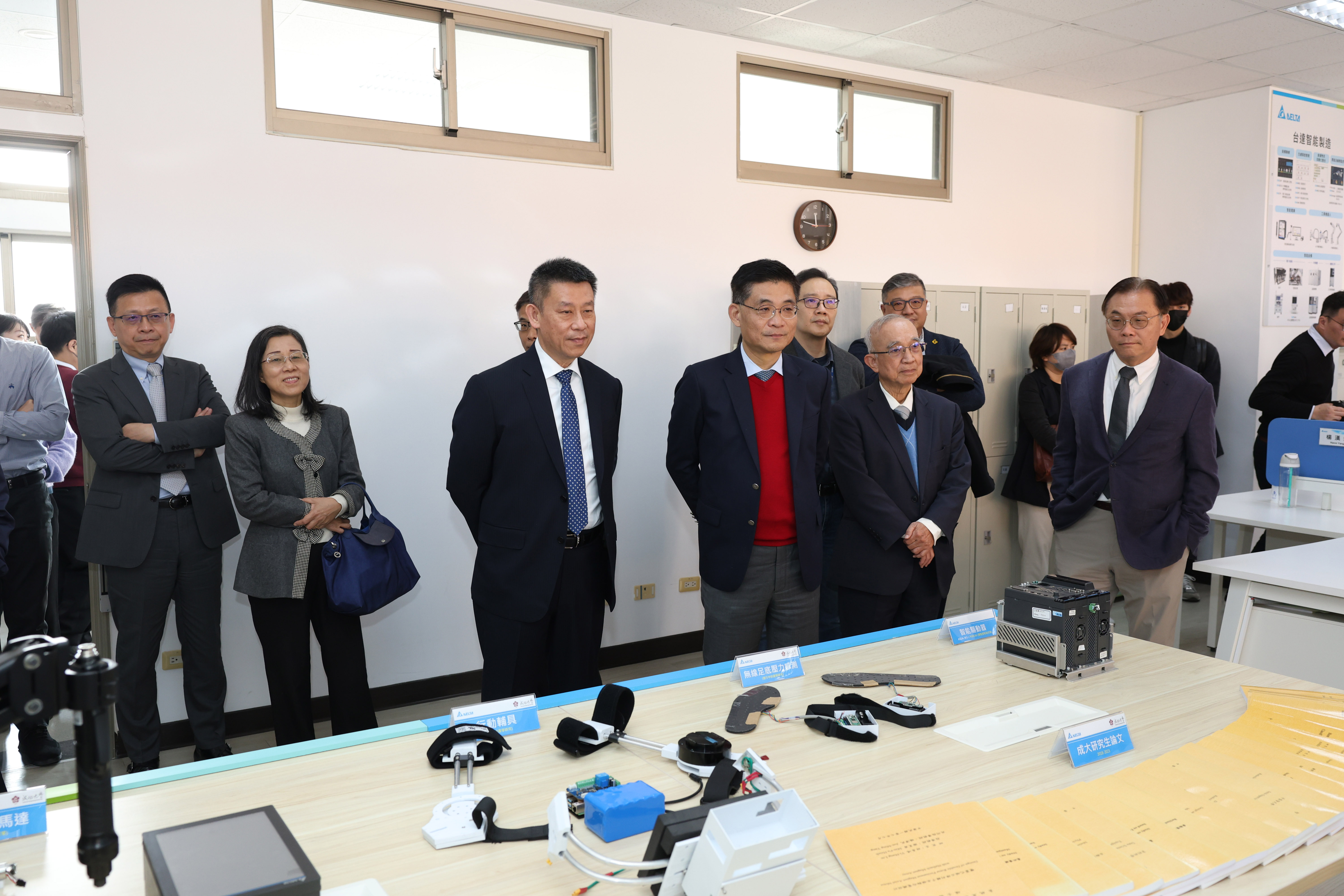NCKU and Delta Electronics Unveil Joint Research Center, Focusing on Green Energy and Smart Automation Applications
Written by Lin Yun-Mao. Image credit to News Center
On January 11, National Cheng Kung University (NCKU) and Delta Electronics (Delta) co-founded the Delta-NCKU Joint Research Center. The unveiling ceremony, presided over by Delta's CEO, Mr. Cheng Ping and NCKU's President Shen Meng-Ru, marked the milestone of the cooperation. The collaboration between the two parties had a deep-rooted history. In 2021, Delta joined NCKU's Academy of Innovative Semiconductor and Sustainable Manufacturing. In 2024, Delta integrated the resources and expanded the scope of the partnership by funding more than ten million to establish the Delta-NCKU Joint Research Center, which would focus on green energy and smart manufacturing applications. The objective was to develop a new generation of technology talents who were both innovative and practical by aligning academic research with the needs of industry technology development. To accomplish this goal, more than ten professors from various departments and units would collaborate with the center, including the College of Electrical Engineering and Computer Science, the College of Engineering, and the Research Center for Energy Technology and Strategy.

Delta and NCKU announced the establishment of the Delta-NCKU Joint Research and Development Center. The ribbon cutting ceremony was attended by Delta CEO Cheng Ping (3rd from the left), NCKU President Shen Meng-Ru (3rd from the right), the CTO of Delta Communication Technology Business Group , Charles Tsai (1st from the left), the general manager of Delta Industrial Automation Business Group , David Tsai (2nd from the right), NCKU Executive Vice President Chuang Woei-Jer (2nd from the left), and the director of the Delta-NCKU Joint Research Center, Liang Tsorng-Juu (1st from the right). This event marked the beginning of a new phase of collaboration.
CEO Cheng stated that students cultivated by NCKU exhibited outstanding proficiency in professional knowledge and possessed a spirit of exploration and dedication, aligning well with NCKU's motto 'seek for truth, toil for good.' This enabled them to wholeheartedly engage in teamwork and problem-solving. Due to the excellence of NCKU graduates, NCKU has long been a key partner university for Delta. Furthermore, among Delta's current employees, NCKU graduates hold the highest percentage. In 2023, more than a hundred newcomers graduated from NCKU. To deepen collaboration in industry-academia and talent cultivation, the Delta-NCKU Joint Research Center was established on the foundation laid in previous years. Each year, NCKU graduate students were expected to participate in technical and experimental research activities. The research fields aligned with Delta's focused development areas, such as efficient power supplies, renewable energy, and smart manufacturing. Creating a win-win situation for both industry and academia was the final goal.

On the basis of previous cooperation, the joint research center will focus on forward-looking technologies such as green energy and smart manufacturing. The aim of the center is to produce a new generation of technical talent with both innovation and practical skills by integrating academic research with the requirements of industrial development.
President Shen said that Delta Electronics, being a global leader in power management, continued to develop innovative power-saving products and solution strategies. Since its founding in 1931, NCKU has carried a special mission of social participation, with a strong emphasis on promoting industry-academia cooperation and achieving remarkable results, ranking first in Taiwan several times. NCKU currently has nine colleges, an affiliated hospital, and two new emerging colleges, creating a conducive environment for interdisciplinary research and finally implementing research outcomes to effectively address the needs and challenges of social development. Through the center, NCKU and Delta Electronics can exploit each other's strengths and research resources. Experts from Delta will collaborate with professors from the College of Electrical Engineering and Computer Science, the College of Engineering, and the Research Center for Energy Technology and Strategy. Together, they will guide students in forward-looking technologies research and studies, aiming to translate research results into practical applications and serve as innovation drivers for the company. The anticipation is to achieve new heights in international papers, patents, and awards through intensive exchanges and stimulation of industry-academia communication, contributing greatly to the fields of green energy and smart automation.

This year, Delta consolidates resources and expands collaboration to establish a joint research and development center. The center will closely collaborate with over ten professors from various departments and university units, including the College of Electrical Engineering and Computer Science, the College of Engineering, and the Research Center for Energy Technology and Strategy.
Delta and NCKU have a long-standing collaboration. In addition to the K.T. Li Technology and Literature Lectureships Awards , which provide long-term support for outstanding NCKU scholars, and the 'Delta Advanced Technology Research Center' founded in 2018, the Delta-NCKU Joint Research Center was established this year. This center will serve as the bridge between education and industry, with a primary focus on green energy and smart manufacturing. The previous field concerns the development of high-frequency and high-power power converters of third-generation semiconductors, as well as renewable energy technologies. The goal is to advance energy conversion technology while improving energy efficiency, accelerating the use of renewable energy to address the challenges of climate change and energy sustainability. As for the field of smart manufacturing, the center emphasizes exploring cutting-edge technologies, including the design of new motors and precision positioning control, the application of AI in robotics, and AI-based intelligent diagnostics. Delta and NCKU will integrate their resources more effectively, aligning industry and academia. Through the establishment of experimental fields and support for various research and development projects, the collaboration aims to cultivate talented individuals with a combination of practical and theoretical expertise, paving the way for a new future in Taiwan's industrial landscape.

By integrating resources and aligning industry and academia, Delta and NCKU aim to cultivate talents with professional knowledge and practical experience, contributing to shaping the new industrial landscape in Taiwan.
Provider:
NCKU News Center
Date:
2024-01-26




